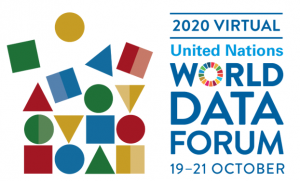 CODATA held a live panel session in relation to its a pre-recorded session ‘Multi-Stakeholder Data
CODATA held a live panel session in relation to its a pre-recorded session ‘Multi-Stakeholder Data
We held a live panel discussion on the session on Friday 16 October and the recording of the live session is now available below and from the CODATA Channel on Vimeo.
The recording of the pre-recorded session may be viewed in the UN Data Forum Attendify and may also be viewed here and on the CODATA Vimeo Channel.
Please register for the UN Data Forum, 19-21 October: https://unstats.un.
About the Pre-Recorded Session and the Live Discussion
In the session we hear from a number of cross-domain initiatives that undertaking activities to make data and other resources richer, more valuable and easier to combine. The presentations speak about projects and initiatives doing the essential work to add value to data and information. This involves detailed technical work, work on semantics and definitions. It also requires collaboration across communities, sectors and domains. It can sometimes sound difficult and technical, but it is fundamental and the benefits are enormous.
As part of the ISC’s new Action Plan, CODATA has been tasked to develop an international collaborative programme, a Decadal Programme, entitled ‘Making Data Work for Cross Domain Grand Challenges’: we are currently putting in place the components of this work and the programme will be launched at the ISC Assembly in 2021.
The premise of the Decadal Programme is that the major scientific and global challenges of our age (including climate change mitigation and adaptation, disaster risk reduction, the SDGs, resilient cities and so on) are necessarily cross domain, cross sectoral. Addressing these issues requires many things, including the contribution of science, collaboration across domains, evidence-based policy and action, and evidence that is soundly based on data. Addressing these issues requires – fundamentally – us to improve our ability to combine data and to combine data from different sources. This requires openness. It requires standardisation (particularly in relation to terminologies and metadata). And it requires collaboration. The presentations which follow exemplify these attributes.
In the first part of the pre-recorded session we highlighted three examples of extremely valuable work on terminologies and semantics, applied to issues of the first order of importance. This includes presentations on the review of hazard definitions and classifications that will underpin Sendai reporting; on the activities to enhance the records of the UN General Assembly and to make the resolutions machine-readable; and on the application of Internationalized Resource Identifiers (IRIs) for Sustainable Development Goals to make data and information relating to the SDGs more accessible and usable.
Building on these examples, the next three presentations charted an arc from challenges with data and information on the ground to some possible solutions. We heard from a cross-domain case study in infectious disease research through which the scientific community is contributing to enrich knowledge in relation to SDGs. Then two presentations will explore the prospects for cross domain and multi-stakeholder data bridges using standards-based semantics and metadata.
In the live discussion session each presenter gave a very short presentation, highlighting the key points from their full presentation in the pre-recorded session. We held a structured discussion facilitated by Arofan Gregory, and then took questions from the audience, chaired by Simon Hodson.
Speakers
- Virginia Murray, Public Health England and CODATA, ‘UNDRR / ISC Sendai Hazard Definition and Classification Review’
- Remo Lalli, United Nations, ‘Digital Document Management in the United Nations: a new paradigm’
- Cecilia Elizalde, United Nations, ‘Machine-readable resolutions’
- Chifundo Kanjala, London School of Hygiene and Tropical Medicine, ‘Infectious diseases cross-site data harmonisation in Africa’
- Alejandra Gonzalez Beltran, Science and
Technology Facilities Council, ‘Data bridges for scientific and official data integration’ - Arofan Gregory, a Metadata Consultant working with the Data Documentation Initiative and with CODATA, ‘DDI-CDI: Data Documentation Initiative-Cross Domain Integration’ and ‘Summary of the Session Themes’
Session Description
Solving today’s global grand challenges demands that both scientific and policy research embrace new innovations and synergies as well as multi-stakeholder
Analyses can benefit from cross-cutting techniques not restricted to those of a single domain. International data used to monitor policy are a fundamental ingredient in many research projects, both in academia and for policy research. They facilitate and improve the quality of research on the ground and can also be improved through the incorporation of data from the scientific community and elsewhere. Creating a two-way bridge between scientific research data and official data is vital.
New technologies leverage huge amounts of data, relying on semantic integration, openness, and the use of machine-learning. They require a massively increased use of data from both traditional and new sources. The plethora of formats and semantics, and the paucity of metadata create barriers to employing the new data-intensive techniques. We do not need new standards, new classifications, and new technology approaches, so much as we need to make those we already have work together effectively through multi-stakeholder
Initial work has started through a series of workshops, projects and case studies, bringing together experts from diverse communities. The effort is use-case driven, covering urban resilience, disaster risk reduction, and infectious disease. These efforts are producing early draft guidelines – grounded in the FAIR data principles – to help build the communities of practice for the use of data across domain boundaries. The FAIR data principles are gaining traction across the global data ecosystem and being embraced by multiple stakeholders, including international organizations, public sector, civil society, academia and the business community.
Building on existing technical standards such as DDI and SDMX, on the wealth of semantic technologies from the W3C and elsewhere, and on machine-learning and data science techniques, the Decadal Programme will bring a cross-disciplinary, trans-community approach to how we manage, combine and use data. This session will provide an overview of these efforts, covering data documentation,
